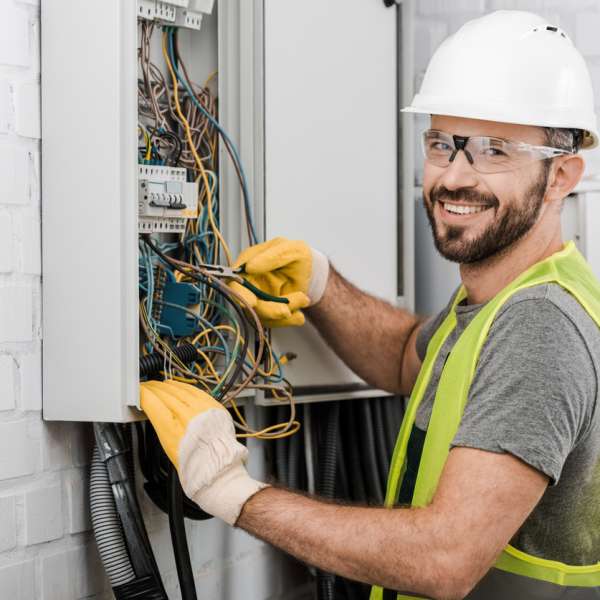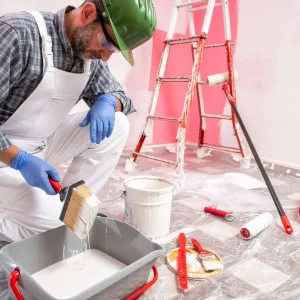Following electrical safety guidelines is a must for electricians. The nature of your work is dangerous, and one wrong step could result in a serious injury or property damage. Knowing how to safely work with electrical systems helps protect you, your customers, and their property.

Here are seven electrical safety tips for electricians:
1. Know the electrical safety codes
Knowing and understanding safety codes in your area is part of an electrician’s job. Safety codes are designed to lessen injuries, fatalities, and property damage caused by electrical accidents. You should also equip yourself and your business to local and national electrical safety guidelines and follow industry regulations.
2. Wear protective gear
Responsible electricians know how important it is to wear protective gear on the job. Safety equipment and PPE help keep your sweat from coming into contact with live electrical currents. Electricians should wear:
- A hard hat
- Electrical gloves
- Shatter-proof eye protection
- Non-conductive footwear
3. Do not use damaged tools or equipment
Broken equipment and tools increase your chances of being seriously injured (or worse). Electrical work requires accuracy. Well-maintained equipment is important to get the job done right and safely. This includes your protective gear; you may not be properly protected if your PPE is damaged.
4. Always turn off the mains
This is one of the most basic electrical safety rules, but it can be easy to miss. Make a habit of always turning off mains power before you begin any electrical work. If you are working with others, don’t just take their word that the power is switched off. Verify it yourself to be sure.
On a construction site, notify other contractors that you are turning off the mains. Posting an “Electrical Work in Progress – Do NOT switch on” sign over the circuit box could warn others who may be unaware that electrical work is happening.
5. Install warning signs
Electricity can be dangerous, and you may need to warn others in the surrounding area when work is happening. As we’ve already mentioned, hanging a sign over circuit boxes could help you avoid injuries while working on busy construction sites.
Warning signs should be installed around high-voltage equipment. These can help keep members of the public away from dangerous areas while you work or places they should not access for their own safety. You may need to work with the property owner or manager if permanent signage or physical barriers are required.
5. Don’t work beyond your training or qualifications
Not all electrical work is the same. While you may be licensed as a residential electrician, that doesn’t mean you are qualified to do commercial, high-voltage, or other specialized work. You may need additional study and training to expand your knowledge and skillset.
Working beyond your training could put you and others in a dangerous situation. If you are called to a job that you’re not qualified for, referring the customer to someone who can do the work is a wise move. This shows that you value safety and speaks well to your professionalism.
6. Be prepared for emergencies
Knowing how to respond in an emergency is an important electrical safety tip. Electricians may want to take a first aid course and become CPR certified. Knowing how to safely extinguish fires is also a useful skill to have.
You should also consider making an emergency response plan. This helps guide you or your employees’ actions after an incident occurs. You might include a list of people to notify and how to document the event (such as photos, video, and writing a witness statement) for the authorities or your insurance provider.
7. Consider insurance for electricians
Accidents happen to even the most careful and skilled electricians. That’s why many electricians consider insurance to protect their business and assets. Different forms of coverage can help you respond to injury or property damage claims from your customers, replace damaged tools, and handle unplanned business interruptions.
Electrician health and safety tips checklist
You should always do your part to create a safe workplace, especially when working with electricity. Before you head to your next job, consider taking the following steps:
- Review local and federal safety regulations
- Check that you have proper safety gear
- Inspect your tools and equipment for damage, and arrange repairs or replacements before starting work
- Turn off mains power or visually verify it is off before beginning work
- Notify other contractors before turning off mains power
- Use warning signs while you work
- Refer jobs beyond your qualifications to a more experienced licensed electrician
- Have a first aid kit in your vehicle to treat minor injuries
- Keep your CPR certification current (or consider getting one if you don’t have it already)
- Learn methods for safely extinguishing fires
- Consider different types of business insurance
With BizInsure, you can compare insurance for electricians and get covered in minutes. Get started today!



